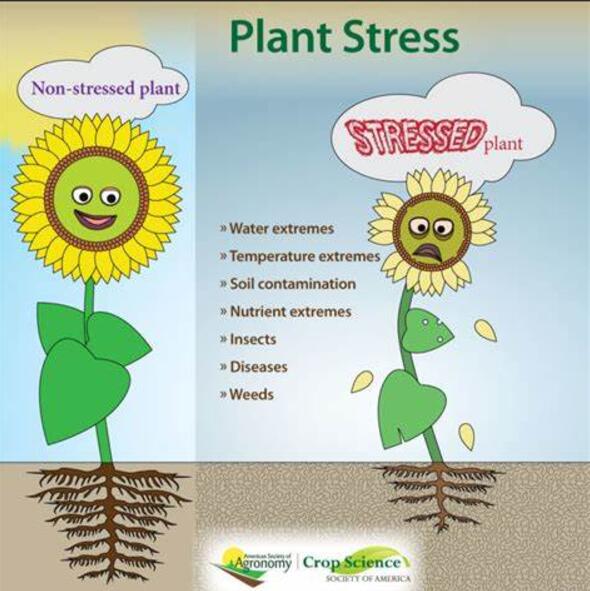Drought is a lesser evil than cold for photosynthesis and assimilation metabolism of maize
IF 6.8
Q1 PLANT SCIENCES
引用次数: 0
Abstract
Cold is one of the abiotic environmental factors that severely affect plant metabolism. It causes changes in the fluidity of biological membranes, induces oxidative and osmotic stress, photoinhibition, reduces photosynthetic rates and slows down numerous metabolic enzyme activities. Some effects of cold overlap with drought response processes. Drought itself has a dualistic effect on plants. Severe drought stress is detrimental, while a mild preceding drought may prepare the otherwise sensitive maize to cope with cold. This study focused on the effects of mild drought on photosynthesis, sugar and amino acid metabolism at low temperature. Maize (Zea mays L.) plants were drought-hardened (15±5% relative soil moisture) between stages V4 and V6 at 25°C for 10 days and then subjected to cold treatmet at 10°C for 2 weeks at two light levels (PPFD=450 and 150 µmol m-2 s-1). The control population was watered daily (35±5% soil moisture), and in completely dried pots, 5±3% soil moisture was measured. The present results confirmed that photosynthetic performance and glutamine biosynthesis were positively affected by drought under both light intensities. Plants exposed to combined cold and moderate drought stress had a higher dry weight than those exposed to cold stress alone. The metabolism of several sugars, organic acids and amino acids was maintained by mild drought acclimation. The cold protective DHN2-like dehydrin gene was induced by moderate drought treatment, which may have contributed to the drought-induced higher tolerance to low temperature. However, cold stress markers were lower in low light than in normal growth light under drought acclimation, suggesting that drought-induced stress defense may require a certain level of light.
对于玉米的光合作用和同化代谢来说,干旱比寒冷更可怕
寒冷是严重影响植物新陈代谢的非生物环境因素之一。寒冷会导致生物膜的流动性发生变化、诱发氧化和渗透胁迫、光抑制、降低光合速率并减缓多种代谢酶的活动。寒冷的某些影响与干旱反应过程重叠。干旱本身对植物具有双重影响。严重的干旱胁迫是有害的,而之前的轻度干旱可能会让原本敏感的玉米做好应对寒冷的准备。本研究的重点是轻度干旱对低温下光合作用、糖和氨基酸代谢的影响。将 V4 期和 V6 期之间的玉米(Zea mays L.)植株在 25°C 下进行为期 10 天的干旱硬化(相对土壤湿度为 15±5%),然后在两种光照水平(PPFD=450 和 150 µmol m-2 s-1)下于 10°C 下进行为期 2 周的冷处理。对照组每天浇水(土壤湿度为 35±5%),在完全干燥的花盆中,测量土壤湿度为 5±3%。本研究结果证实,在两种光照强度下,光合作用和谷氨酰胺生物合成都受到干旱的积极影响。与只受到冷胁迫的植物相比,同时受到冷胁迫和中度干旱胁迫的植物干重更高。通过轻度干旱适应,几种糖类、有机酸和氨基酸的代谢得以维持。中度干旱处理诱导了类似 DHN2 的冷保护性脱水素基因,这可能是干旱诱导的较高低温耐受性的原因之一。然而,在干旱适应条件下,弱光下的冷胁迫标记低于正常生长光下的标记,这表明干旱诱导的胁迫防御可能需要一定的光照水平。
本文章由计算机程序翻译,如有差异,请以英文原文为准。
求助全文
约1分钟内获得全文
求助全文
来源期刊

Plant Stress
PLANT SCIENCES-
CiteScore
5.20
自引率
8.00%
发文量
76
审稿时长
63 days
期刊介绍:
The journal Plant Stress deals with plant (or other photoautotrophs, such as algae, cyanobacteria and lichens) responses to abiotic and biotic stress factors that can result in limited growth and productivity. Such responses can be analyzed and described at a physiological, biochemical and molecular level. Experimental approaches/technologies aiming to improve growth and productivity with a potential for downstream validation under stress conditions will also be considered. Both fundamental and applied research manuscripts are welcome, provided that clear mechanistic hypotheses are made and descriptive approaches are avoided. In addition, high-quality review articles will also be considered, provided they follow a critical approach and stimulate thought for future research avenues.
Plant Stress welcomes high-quality manuscripts related (but not limited) to interactions between plants and:
Lack of water (drought) and excess (flooding),
Salinity stress,
Elevated temperature and/or low temperature (chilling and freezing),
Hypoxia and/or anoxia,
Mineral nutrient excess and/or deficiency,
Heavy metals and/or metalloids,
Plant priming (chemical, biological, physiological, nanomaterial, biostimulant) approaches for improved stress protection,
Viral, phytoplasma, bacterial and fungal plant-pathogen interactions.
The journal welcomes basic and applied research articles, as well as review articles and short communications. All submitted manuscripts will be subject to a thorough peer-reviewing process.
 求助内容:
求助内容: 应助结果提醒方式:
应助结果提醒方式:


